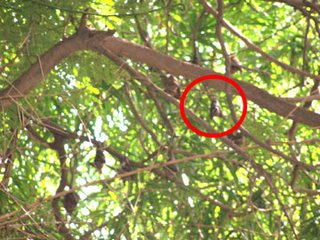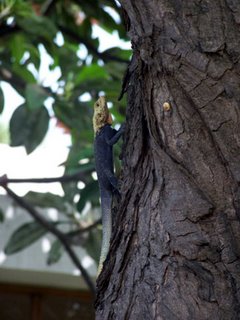Chris Moiser writes...
 There are fruitbats in the canopy ..... honest!
There are fruitbats in the canopy ..... honest!Monday, and it's Banjul
As an occasional visitor to Banjul I was nominated to write today's report. Banjul is the capital of the Gambia; in the old colonial days it was called Bathurst. After independence the name changed; not just the city, but street names as well. Signs for Wellington Street and Buckle Street are still around though.
The purpose of the visit was multi-purpose; cultural, musical and exploratory. Finding a working cash point would be a bonus. After being dropped at the Atlantic Hotel (toilets, air-conditioining and cold drinks) we walked into town. As an odd looking bunch being led by a middle-aged man in shorts with a purposeful stride we attracted attention, but the local professional friends didn't really show too much interest - we were too much a group on a mission to be ordinary tourists. A military police sergeant, on duty outside part of what used to be government house, looked at the line stretched out behind me, looked at me, smiled and said "You have much work to do". I smiled back and saluted, not quite appropriate, but he returned the salute. Turning and looking at our retinue, it was me, Lisa, Richard, Suzi, Dr. Chris, Ollie, and then apparently an Imam, who seemed to have joined on the end.
We shook the imam off when we went round what used to be McCarthy Square. Into the shopping area proper and I couldn't find the methodist bookshop (used to be the biggest bookshop in the Gambia; cultural, as well religious texts). I did see a police station though, so we went in there to ask - yes they think it still exists and not far away, on the corner of one of the blocks. A plain clothes officer came outside to try and show us the way. As he didn't actually know where it was this was difficult for him. We never did find it. These things often have a serendipitous side to them though, and Dr. Chris saw a cash point. Sadly it was very selective in what European plastic it recognised. Despite encouragement from the locals I was the only one to actually extract anything from it. The maximum withdrawal though is 2000 Dalasis (about £40.00), this comes out as a wad of notes about 1/4 of an inch thick. A trip into the bank revealed many queues with little chance of doing anything but raising temperatures, although as the bank was air-conditioned it was at least a momentary respite from the heat of the day (about 85 degrees, humid and dusty).
All thoughts of getting money abandoned we went on to the market, with the objective of obtaining a copy of the 1980s hit "Ninke Nanke" by Toure Kunde. The professional friends love the market, so much help that they can give to the tourist. The first stall, on the outside, didn't have it, but the security man (3rd generation photocopied identification card - totally illegible) knew where we could. Reluctantly, I followed him into the market. The old Albert market burnt down in the 1980s, the new one is still a maze into which Europeans can disappear. Usually they emerge unscathed, but often poorer. As my new guide led me deeper in I signalled to the rest of the group to stay behind, they did, quite happily. Eventually we ended up at a stall which was clearly closed. Enquiry revealed "This man gone tinkle". After waiting a few minutes I decided to move on and the guide agreed that there were many other music stalls. We found one quickly which was both acceptable to the guide and appeared to have the tune that I wanted. I was instructed to sit whilst the cassette was copied. I sat under a poster stating "The Gambia takes Copyright theft seriously" as my cassette was copied. I then paid an exorbitant price (almost £4.00 sterling equivalent) and left with a casette. The security man/guide who had previously assured me that he didn't want money changed his mind, maybe I give him "small, small money?". A 25 Dalasi note (50p) was clearly far too "small, small" and he was even more upset, when instead of following his directions I went straight back to the group by a direct route of my own choosing. A quick "follow me" route march took us back to the national museum on the edge of town and shook my guide off too. Cold drinks at 20p and admission to the musuem for a £1.00 didn't seem anything but reasonable.
 These humans display some odd behaviour!
These humans display some odd behaviour!The museum is entirely devoted to the history of the Gambia, with only a few posters in the natural history section. Cryptozoologically there was nothing except two pictures of CH Armitage when he was governor (1920 - 1927). It would have been nice if he was photographed with his skink, however he was with the prince of Wales, which, for colonial history purposes might possibly be more appropriate. A couple of members of the team bought books on Gambian folklore, hoping for mentions of Ninke Nanke or other strange animals. (There weren't any, although Richard did find mention of a Ghanaian giant snake).
 Raising a glass to J.T.Downes (Sr)
Raising a glass to J.T.Downes (Sr)After the museum it was five minutes walk back to the Atlantic hotel where we made our way through the main lobby and out to the gardens and pool. Sitting by the pool I tried to order a Chapman's for everyone. A Chapman's is the (soft, fruity) drink that has been drunk at the Atlantic since well before the days of tourism. It is the European Gambian drink. They didn't have a cocktail shaker and so couldn't do one, we made do with the local bottled fruit cocktail. In view of the history of the hotel and its colonial antecedents it seemed the most appropriate place to toast the memory of Mr. Downes Senior; we were all here on the John T. Downes memorial trip and he had spent some time in West Africa (although not The Gambia). I had spoken to him on a couple of occasions about the Gambia and he was keen on colonial history. Having just been to the museum and then being in the original European hotel it just seemed the right place to do it.
Having finished our drinks I then took the group around the corner, but still within the hotel grounds. Here, between the "new hotel" (Built in 1980) and one of the old hotel blocks there is a small square of fairly dense trees, which is usually referred to as the "Atlantic Bird Garden". This enabled us to see the usual speckled pigeons, some Barbary Shrikes, possibly the most colourful of the Gambian medium sized birds, and, to Richard's delight, a bunch of roosting fruit bats. Unfortunately a squadron of hungry mosquitoes then descended upon us, literally after blood, and we had to leave the woods at speed.

Assan - the best taxi service in the whole of Gambia
Our drivers, Assan and Omar, were waiting outside and within 25 minutes had us back at Bakau and the hotel. An afternoon out in Banjul was £12.00 per taxi, including waiting. I regularly use Assan Njie, over the years he has become a friend. His car is well maintained by Gambian standards and he promises "a Happy trip". Despite little cryptozoological content to this trip it was a "happy trip", and we had at least confirmed that we had not missed something that might have been present in the museum, and on show to everyone who could be bothered to look.

0 Comments:
Post a Comment
<< Home